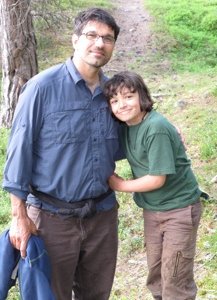
Matt grew up in rural southern Oregon, the son of a horse logger and an elementary schoolteacher. He has an undergraduate degree in Biology from the University of Oregon and a Ph.D. in Environmental Studies from the University of California, Santa Cruz. Matt has worked on topics that include the management and recovery of peregrine falcons, habitat quality and fidelity of North Pacific whale species, the effects of range management on carnivores in southern Africa, the dynamics of elk populations, and interactions among wolves, elk and aspen. In 2006, Matt joined the Wyoming Cooperative Fish and Wildlife Research Unit and the faculty of the Department of Zoology and Physiology at the University of Wyoming; he is currently the leader of the Wyoming Coop Unit. Matt and his graduate students are conducting studies on elk, wolves, moose, deer, and bighorn sheep in Wyoming, addressing the influence of habitat condition, predation, human disturbance, and energy development on these species. Matt’s research combines work on animal physiology, behavior and demography to better understand population- and landscape-level processes. A primary focus of this work is to provide timely information to agency biologists charged with managing Wyoming’s wildlife.
Professional Preparation and Appointments
| University of Oregon | Biology | B.A., 1992 |
| University of California, Santa Cruz | Environmental Studies | Ph.D., 2003 |
| University of California, Santa Cruz | Conservation Biology | postdoc, 2003 |
| University of Montana | Conservation Biology | postdoc 2003-2004 |
Appointments
| Unit Leader | Wyoming Cooperative Fish and Wildlife Research Unit | 2010 – |
| Assistant Leader for Wildlife | Wyoming Cooperative Fish and Wildlife Research Unit | 2006 – |
| Assistant Professor | Zoology and Physiology, University of Wyoming | 2006 – |
| Assistant Research Professor | Biological Sciences, University of Montana | 2004-2006 |
Publications
Kauffman, M.J., J. Brodie, and E.S. Jules. 2010. Are wolves saving Yellowstone’s aspen? A landscape-level test of a behaviorally mediated trophic cascade. Ecology 91:2742-2755. View PDF
Sawyer, H.S., M.J. Kauffman, R.M. Nielson and J. Horne. 2009. Identifying and prioritizing ungulate migration routes for landscape-level conservation. Ecological Applications 19:2016-2025. View PDF
Harris, N.C, M.J. Kauffman, L.S. Mills. 2008. Ungulate population demography and dynamics from age ratios. Journal of Wildlife Management 72:1143-1151. View PDF
Kauffman, M.J., N. Varley, D.W. Smith, D. Stahler, D. MacNulty, and M.S. Boyce. 2007. Landscape heterogeneity shapes predation in a newly restored predator-prey system. Ecology Letters 10:690–700. View PDF
Raithel, J.D., M.J. Kauffman, D.H. Pletscher. 2007. Impact of spatial and temporal variation in calf survival on the growth of elk populations. Journal of Wildlife Management 71:795-803. View PDF
Kauffman, M.J., M.A. Sanjayan, J. Lowenstein, A. Nelson, R.M. Jeo and K.R. Crooks. 2007. Using remote photography methods and analyses to assess the conservation value of rangelands for Namibian carnivores. Oryx 41:70-78. View PDF
Kauffman, M.J., and J.L. Maron. 2006. Consumers limit the abundance and dynamics of a perennial shrub with a seed bank. American Naturalist 168:454-470. View PDF
Kauffman, M.J., and E.S. Jules. 2006. Understanding spatial heterogeneity is necessary for predicting invasion: host size and environment influence susceptibility to a non-native pathogen. Ecological Applications 16:166-175. View PDF
Kauffman, M.J., J.F. Pollock and B. Walton. 2004. Spatial structure, dispersal, and management of a recovering raptor population. American Naturalist 164:582-597. View PDF
Kauffman, M.J., W.F. Frick and J. Linthicum. 2003. Modeling habitat-specific differences in survival, fecundity, and population growth for peregrine falcons in California. Ecological Applications 13:1802–1816. View PDF
Projects
- Elk Nutritional Condition Project
- Phenology Tracking by Migratory Mule Deer
- Influence of Beetle Kill on Elk and Hunter Resources Selection and Interactions
- Sublette Moose Project
- Improving Connectivity Across Interstate-80: Pronghorn Movement along a Statewide Barrier
- Baggs Mule Deer Study
- Red Desert to Hoback Mule Deer Project


